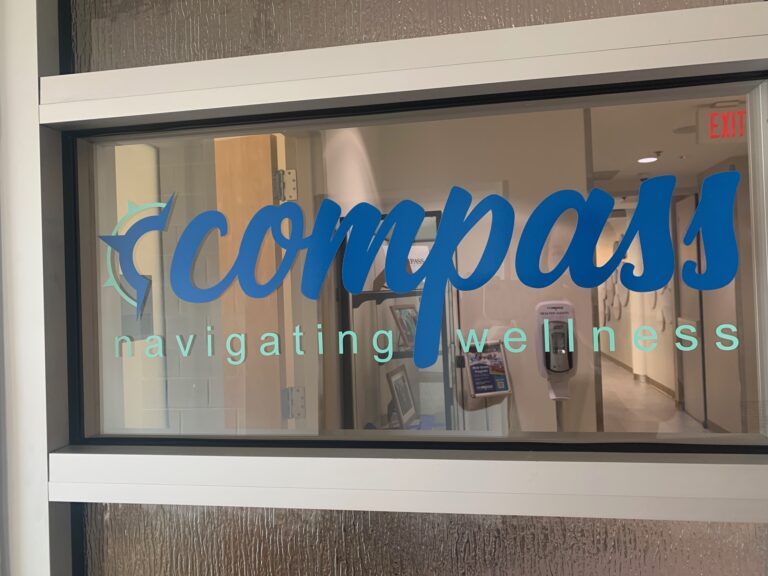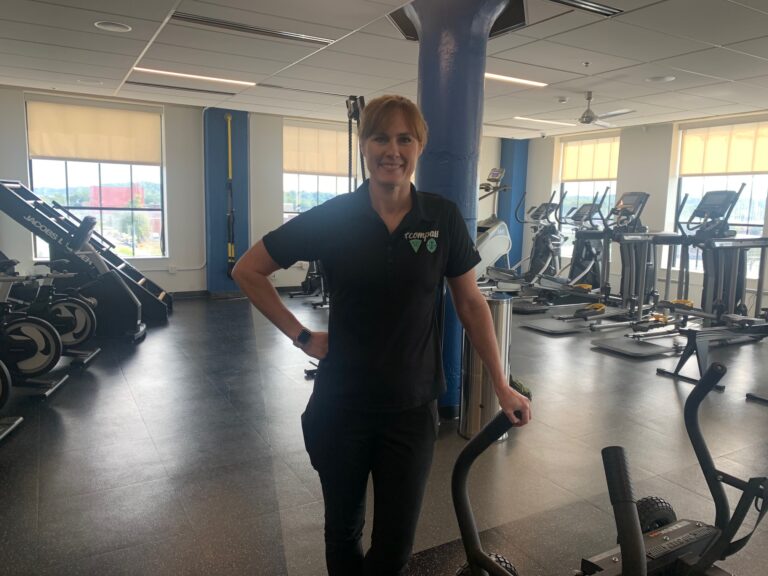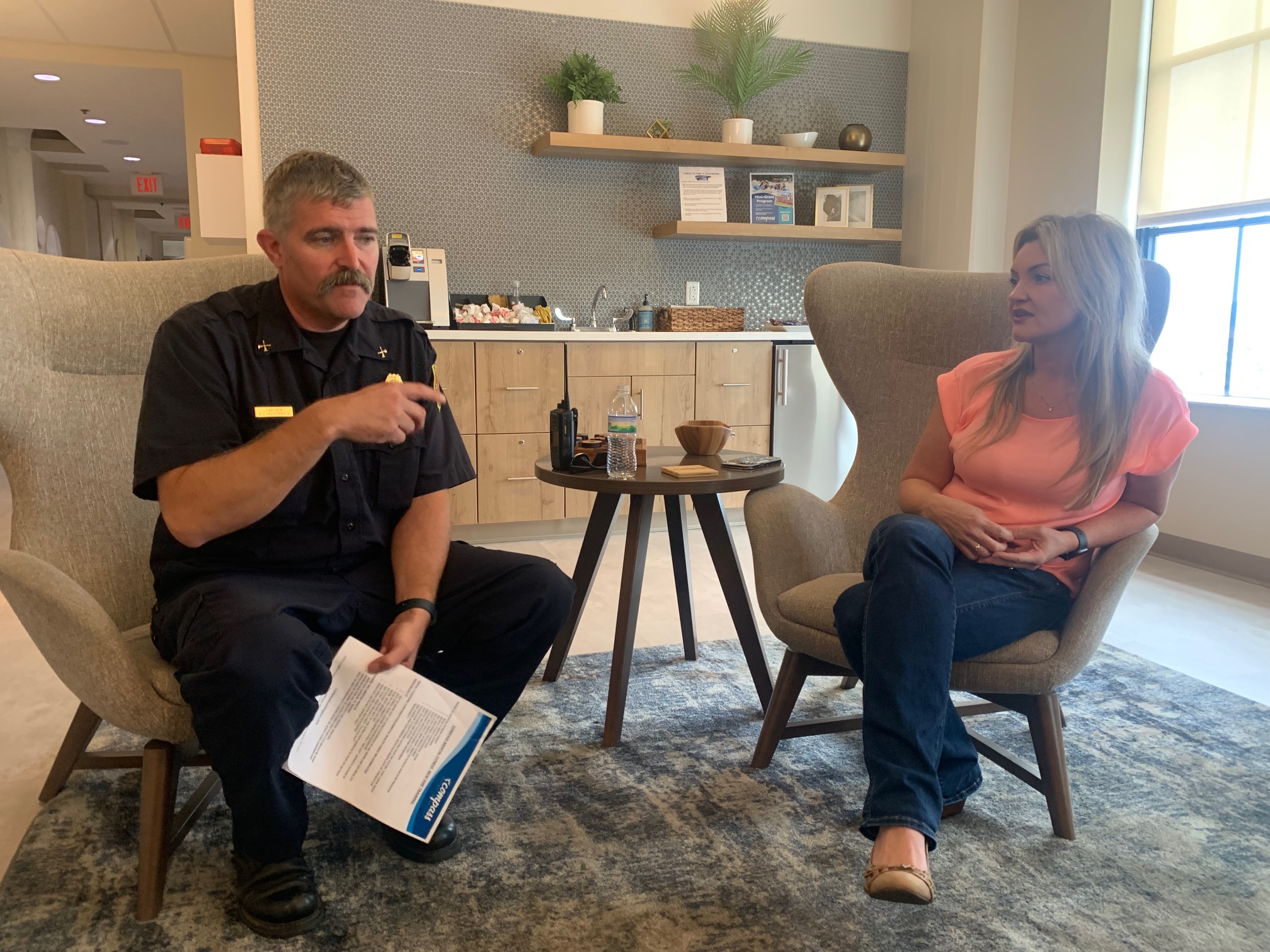Photo caption: Captain Steve McCormick, a 20-year veteran of the Huntington Fire Department and a member of Compass’ advisory board, talks about the mental health issues that can arise from witnessing traumatic events as a firefighter with Amy Jefferson, mental health coach for Compass in Huntington, W.Va. (Lori Kersey | West Virginia Watch)
First responders face increased risks of post traumatic stress disorder and other mental health problems. One West Virginia city says its program is helping.
BY: LORI KERSEY – OCTOBER 9, 2023 6:00 AM
After 20 years as a Huntington firefighter, there aren’t many places left in the city that don’t remind Captain Steve McCormick of something traumatic he witnessed while on duty.
“When the [Ritter Park] Rose Garden bridge up here was closed, I had to take a different route home, and just driving past certain houses, I’m like, ‘holy s—, that was a bad day that day,’” McCormick said. “There’s not very many places in Huntington I couldn’t drive and be like, ‘man that was tough.’”
McCormick has been diagnosed with post traumatic stress disorder, and he’s not alone in the profession. According to the Substance Abuse and Mental Health Services Administration, an estimated 30% of first responders develop behavioral health conditions like depression and post traumatic stress disorder. Firefighters and police officers are more likely to die by suicide than they are in the line of duty, according to the Centers for Disease Control and Prevention.
A program the city of Huntington started to help make its police officers and firefighters more resilient to the jobs’ mental toll is showing signs of success, city leaders say.
Huntington started the Compass program to address compassion fatigue facing the city’s first responders as a record number of drug overdoses deluged the city. In 2016, Cabell County had the highest fatal drug overdose rate in West Virginia, while the state had the highest drug overdose death rate in the country.
The city started the program in 2018 with the help of a three-year $1 million grant from the Bloomberg Philanthropies U.S. Mayors Challenge Program. The grant covered program-related expenses including salaries, start up costs and data analysis, program director Austin Sanders said.

The city also contributed $250,000 to the Compass Center, a facility within the police department that features a sauna room, yoga and meditation rooms, fitness center and kitchen. Other funding for the facility came through the City of Huntington Foundation, a nonprofit organization, he said.
Since the Bloomberg grant expired in 2021, the city of Huntington has continued to fund the program with about $300,000 a year, Sanders said.
The program has two components: mental and physical health. Wellness coach Amy Jefferson focuses on mental health, while her counterpart Amy Hanshaw focuses on physical health. The two are embedded within the police and fire departments.
Jefferson offers what she calls “mental health coaching.”
“What I do is teach about how to be resilient, teach about growth mindset, about gratitude — stuff that they probably thought was kind of foofoo,” Jeffierson said. “So I have to back everything with ‘here’s all the athletes that do it. Here are all the studies on it. It’s valid and a legitimate thing. And it’s not just a foofoo thing.’”

Hanshaw leads fitness classes and customizes workouts for the first responders.
“A lot of them with HPD, they’ll have back injuries from wearing those belts and she’ll customize workouts for them if they have a shoulder injury,” Jefferson said. “I think that’s priceless.”
Jefferson said the first step for her and Hanshaw was to win the trust of the officers and firefighters. Having an office in the police department has helped, she said.
“I always keep my door open unless someone has something scheduled with me,” she said. “And from the very beginning, I always call it stealth mental health. I just insert myself … . So the guys would come up maybe just to get a coffee in the morning, it still gives me an opportunity to talk to them. My whole job was building trust with just those everyday informal conversations. They trust us now.”
Jefferson and Hanshaw also help craft wellness policies for the departments. One policy they’ve helped develop allows firefighters who work 24-hour shifts an uninterrupted hour of relaxation at the Compass Center, provided nothing out of the ordinary is going on.
“We do have quite a few trucks that come over throughout the day and utilize that,” Jefferson said.
Jefferson and Hanshaw even ride on the fire trucks in their own turnout gear and with the police department, Jefferson said. Jefferson leads stress debriefings after critical incidents.
“When [former Fire] Chief [Jan] Rader was here, she actually called me to a fire scene. And again, I feel at this point it’s like watching your friends go into a burning building and come out.” Jefferson said.
The mental health curriculum Jefferson uses has been implemented into the training for new hires at each department, she said.
While an average person may witness one or two traumatic events in their lifetime, firefighters can see an average of more than a dozen every year, McCormick said.
“The reason why that’s important is because that’s that cumulative stress,” he said. “It just builds up over and over and over. And if we don’t learn if we don’t teach our people or we don’t learn ourselves, how to help mitigate that, or how to deal with that trauma, then our mental health is definitely going to suffer.”
Successes
While the program is just a few years old, leaders say it’s already had some success.
Jefferson said she’s linked 10 to 12 officers or firemen to outside mental health providers in the last year. If that doesn’t sound like very many, she said, consider the demographic. Stigma is still a barrier to first responders seeking help for mental health issues, she said.
“Because it’s that demographic, to me that’s huge,” she said. “That’s 12 people that approached me who were probably honestly at a critical level to even finally say something.”
McCormick, who is a member of the Compass Center’s advisory board, said nowadays talking about mental health among firefighters is more accepted.
“It’s nothing for a guy to say ‘Hi Amy, we’re going to come over to Compass, see if you can talk to so and so, he’s having a bad day.’”

Sanders said data collection and analysis sets the Compass program apart from other wellness programs across the country. The program is under an institutional review board through Marshall University.
“Everything we do with respect to Compass has some sort of data point,” Sanders said. “And the reason we do that is one, we want to make sure that what we’re doing is effective, and two, for every dollar that we spend, we want to make sure that we’re getting some sort of tangible benefit to not only the men and women that wear the uniform of our communities, but also the taxpayers as well. Because at the end of the day, a large percentage of our funding does come from taxpayers.“
The program tracks post traumatic stress disorder, depression, nutrition habits and workforce culture, including job satisfaction, he said.
“We can actually look at our survey and see what are the points that our first responders are satisfied in their profession, what are points where they’re dissatisfied,” he said. “That’s going to be huge for employee retention as well.”
The program is voluntary, but 74% of the police and fire workforce uses Compass in some capacity, he said. Those police and firefighters who use Compass report twice as high levels of job satisfaction compared with those who don’t.
“We also see a 23% increase in self reported satisfaction of soft skills — communication, adaptability, endurance, all of the things that are crucial for being a first responder,” Sanders said.
Another study of Huntington’s firefighters found that firefighters who use the program have a 14.5 second faster response time than those who do not, Sanders said.
“Which doesn’t sound startling at first until you realize that a structure fire doubles in size every 30 seconds,” he said. The city estimates that potentially 22 lives have been saved over two years as a result of that faster response time because of earlier administration of CPR and basic life support, he said.
Replicating the program
While the Compass program was the first of its kind when it started, Huntington leaders want to see other cities copy it.
Officials from the Louisville Metro Police Department in Kentucky reached out to the city of Huntington several months ago to learn more about its wellness program, said Kevin Trager, press secretary for the Office of Louisville Mayor Craig Greenbery.
The police department and the Louisville Metro Police Foundation this month will open a wellness center with in-house mental health professionals for police department employees. The Summit Wellness Center will also have physical therapists, strength and conditioning coaches and a gym on site, Trager said.
Some cities that have shown interest have been intimidated by the facility, Hanshaw said. That’s OK, Hanshaw and Jefferson said the Compass Center is not an essential part of the program.
Before the facility was built, Hanshaw and Jefferson rode along with the police and fire, and led workouts in a gym at the department, but the program still functioned.
“All you really need is two coaches that know what they’re doing, and know how to relate to the population and you have to have a program manager that can manage the back side of everything,” Hanshaw said.
** West Virginia Watch is a nonprofit media source. Articles are shared under creative commons license. Please visit https://westvirginiawatch.com/ for more independent Mountain State news coverage.

